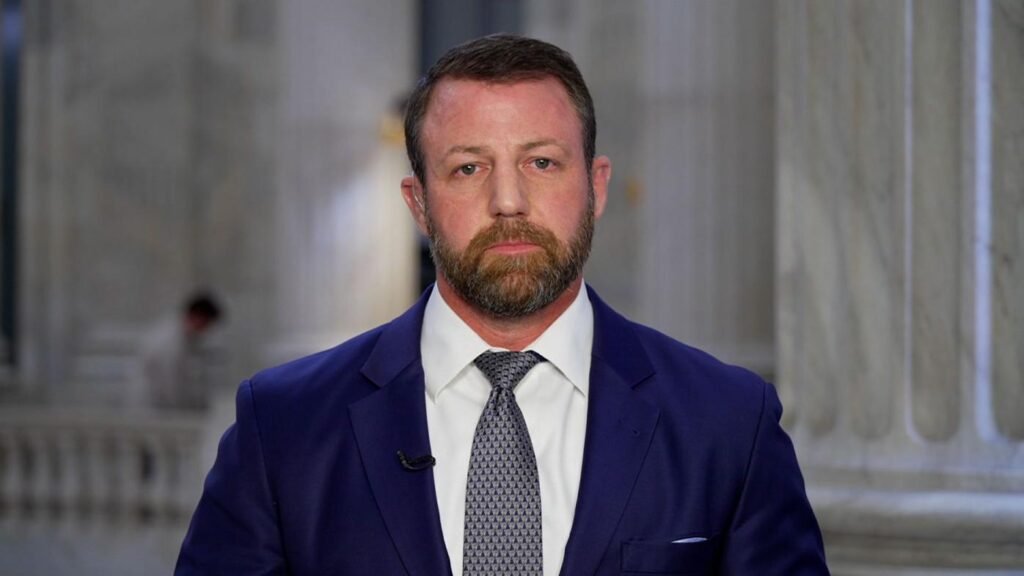Debate surrounding Donald Trump’s decision to pardon and commute sentences of hundreds of January 6 protesters, including those charged and convicted of crimes against police officers, has ignited fierce criticism and intense media scrutiny. CNN’s Erin Burnett pressed Senator MarkWayne Mullin (R-OK) during an on-air interview, asking him directly, “How can you defend people like that?” This exchange underscored broader tension between Republican lawmakers defending Trump’s controversial decision and widespread backlash it has received.
Key Details of Controversy
| Aspect | Details |
| Trump’s Decision | Pardoned hundreds of January 6 protesters, including individuals charged with assaulting police officers. |
| Burnett’s Question | Erin Burnett confronted Sen. Mullin about moral and political implications of defending these actions. |
| Sen. Mullin’s Defense | Mullin framed Trump’s move as addressing perceived injustices against political supporters. |
| Public Reaction | Critics argue pardons normalize political violence and undermine rule of law. |
| GOP Division | Republican lawmakers face growing scrutiny over their support for Trump’s actions. |
Erin Burnett Challenges Sen. Mullin on Live TV
During heated interview, Erin Burnett posed a blunt and challenging question to Sen. MarkWayne Mullin: “How can you defend people like that?” She referred to those pardoned by Trump, including individuals who assaulted police officers and played a role in violent Capitol riot on January 6, 2021.
Burnett highlighted stark contrast between Republican Party’s traditional stance on law and order and its current defense of actions that many view as undermining those principles. She questioned whether GOP’s support for Trump’s decision was a betrayal of its long-standing values.
Sen. Mullin’s Defense of Trump’s Pardons
Senator Mullin, a staunch supporter of Trump, responded by framing pardons as a necessary correction to what he described as a politically motivated crackdown on Trump supporters. He argued that many of those convicted were victims of an overzealous justice system that disproportionately targeted them because of their political beliefs.
“President Trump is standing up for people who feel their voices have been silenced,” Mullin stated. He emphasized that pardons were not an endorsement of violence but rather a response to what he called “a double standard” in justice system.
Divided Reactions Among Republicans
Trump’s decision and subsequent defense by GOP lawmakers like Mullin have revealed deep divisions within Republican Party. While some Republicans echo Mullin’s arguments about fairness and political persecution, others have expressed discomfort with pardoning individuals who committed violent acts, particularly against law enforcement officers.
This internal tension has been exacerbated by public outcry from law enforcement groups, victims of January 6 riot, and political opponents who argue that pardons undermine accountability and set a dangerous precedent for future political violence.
Broader Implications of Trump’s Pardons
Trump’s clemency for January 6 rioters has sparked widespread debate about its implications for American democracy and rule of law. Critics argue that pardons send a troubling message that political violence can be excused if it aligns with certain ideological or partisan goals. This concern has been amplified by inclusion of individuals who assaulted police officers, an act that many believe should be unequivocally condemned.
pardons have also reignited discussions about limits of presidential power. Legal experts have raised concerns about potential abuse of clemency powers for political gain, warning that such actions could erode public trust in democratic institutions.
Public and Media Reaction
public response to Trump’s decision has been sharply polarized. Supporters view pardons as a bold stand against perceived political persecution, while opponents see them as a dangerous escalation in normalization of political violence. Polls show that a significant majority of Americans, including many independents, oppose pardons.
Media outlets have also been divided in their coverage. Conservative commentators have largely defended Trump’s decision, framing it as a correction to an unjust legal process. Meanwhile, mainstream and left-leaning outlets have condemned move as a betrayal of democratic principles and an affront to law enforcement.
Erin Burnett’s Role in Highlighting Accountability
Erin Burnett’s confrontation with Sen. Mullin reflects a broader effort by journalists to hold lawmakers accountable for their positions on Trump’s controversial actions. By asking pointed questions and challenging political rhetoric, Burnett has helped bring critical issues to forefront of public discourse.
Her question—“How can you defend people like that?”—resonates with many Americans who are grappling with moral and ethical implications of pardoning individuals who participated in an attack on nation’s Capitol.
Long-Term Consequences for GOP
Republican Party’s defense of Trump’s pardons could have significant political consequences. By aligning with Trump’s controversial decision, GOP lawmakers risk alienating moderate voters who value accountability and rule of law. This could have implications for upcoming elections, particularly in swing districts where independent and moderate voters play a decisive role.
Furthermore, pardons may embolden extremist groups and individuals who view Trump’s actions as validation of their cause. This potential for increased political violence poses a serious threat to public safety and democratic stability.
Conclusion
controversy surrounding Trump’s pardons of January 6 rioters and Erin Burnett’s challenge to Sen. MarkWayne Mullin highlight deep divisions and moral dilemmas facing American politics today. While Trump’s supporters view pardons as an act of justice, critics argue that they undermine accountability, embolden extremism, and erode trust in democratic institutions.
As nation grapples with fallout from these decisions, question posed by Burnett—“How can you defend people like that?”—serves as a reminder of need for accountability and reflection in a deeply polarized political landscape.
Disclaimer
This article is based on publicly available information and analysis as of January 22, 2025. views expressed are those of author and do not necessarily reflect opinions of affiliated organizations. Readers are encouraged to consult diverse perspectives and additional sources to form a well-rounded understanding of topic.


